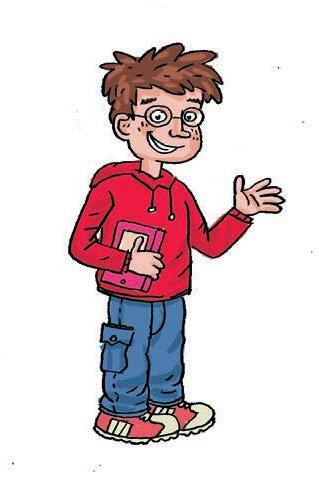






Meet Red and Bess, Meet Nick and Sue, Learn who they are, Learn what they do.



They are school friends, And they’re British. With them you’ll start ENJOYING ENGLISH!









Meet Red and Bess, Meet Nick and Sue, Learn who they are, Learn what they do.



They are school friends, And they’re British. With them you’ll start ENJOYING ENGLISH!

School dinners – yuck!
tense
: at, to, in, for, from, with
‘going to’ for future plans
numbers
some / any
adverbs: +ly / well
possessive pronouns
Nick’s project articles discoveries have to / don’t have to
Things you will and you won’t do
Hi! I’m Trevor. I’m 11 years old. I’m an English boy. I want to be your friend. You see, I’m very clever. I read a lot. I surf the Internet and I know everything. Everybody calls me Clever Trevor!
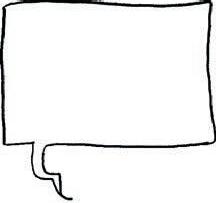
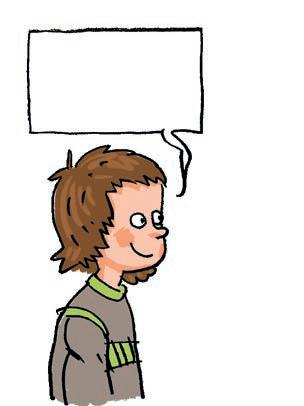
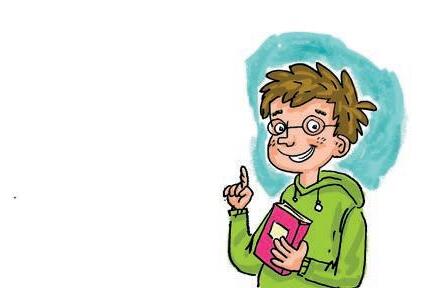
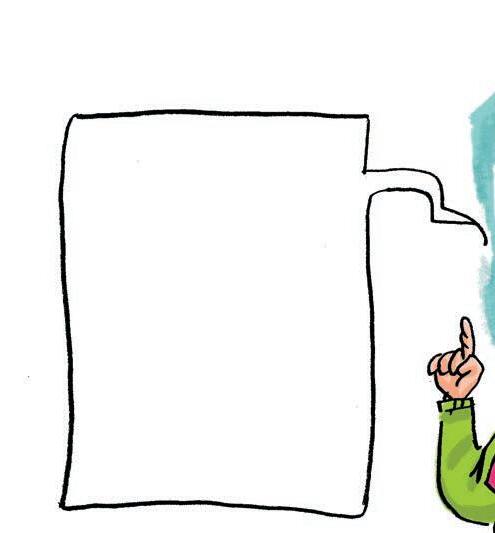
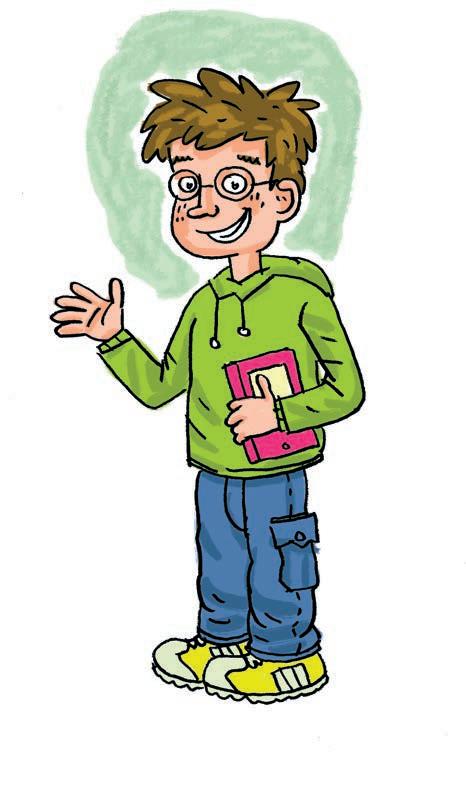
If you don’t understand something, say:
• I don’t understand.
• Sorry! Can you say that again?
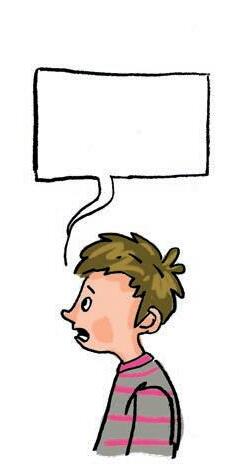
• What does ____ mean?
If you don’t know how to say something in English, say:
• How do you say _______ in English?
• What is ___________ in English?
If you need help, say:
• Can you help me, please?
What does ’remind’ mean?
I don’t know. It means ‘help you remember’.
a) ... name?
• five things that start with ‘B’
• five objects in the classroom
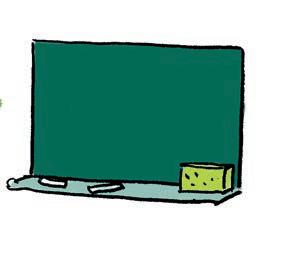
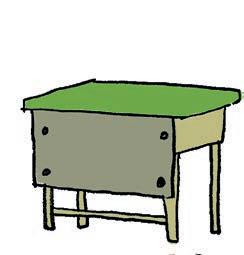
• five school subjects
• five animals
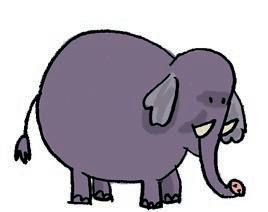
• five colours
• five things you like to eat


• the days of the week
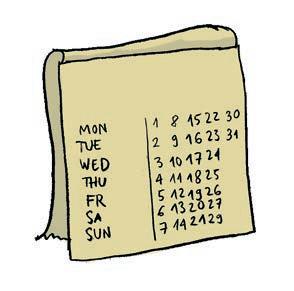
• the months of the year
b) ... read this very fast?
• She sells sea shells on the sea shore!
c) ... read these rhyming letters?
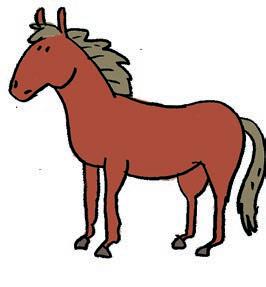
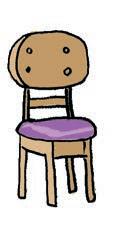
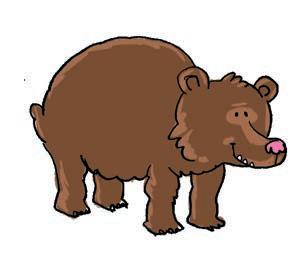
• A-J-K B-C-D-E-G-P-T-V I-Y Q-U-W
g) ... read the numbers and say the next one?
• 23, 33, 43, 53,
• 16, 15, 14, 13,
• 100, 200, 300, 400,
• 1st, 2nd, 3rd, 4th,
• 10th, 11th, 12th, 13th,
h) ... work this out?
d) ... read the message? Cross out the As and Bs!
• BENA JOAYIBNAG EBANAGALBISAH BIS AFUBAN
e) ... spell these words?
book
school
pen
girl
f) ... match the numbers and words?
• 1st the second
• 2nd the third
• 3rd the fifth
• 4th the first
• 5th the fourth
boy
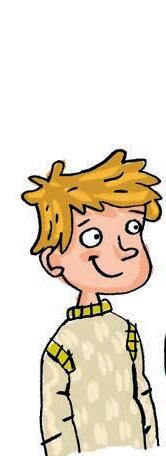
• There are 5 apples in a bag. How can you give these five children an apple each and still have one apple in the bag?
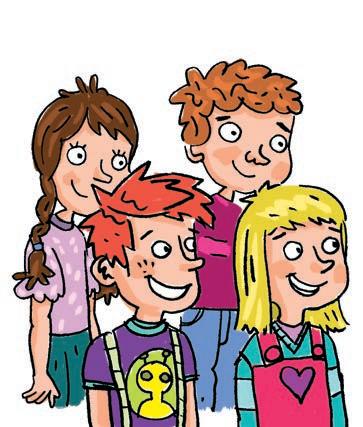
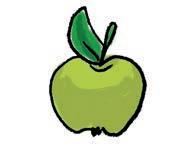
Answer: p. 100
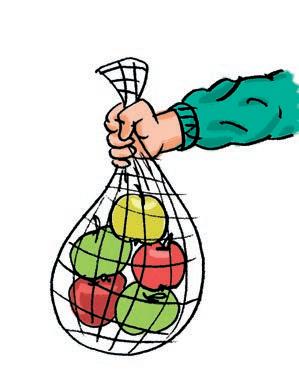
My name’s Betty. I’m ten and a half. I’m from England.
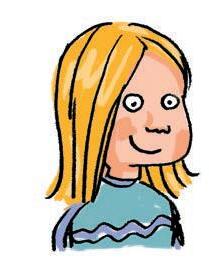
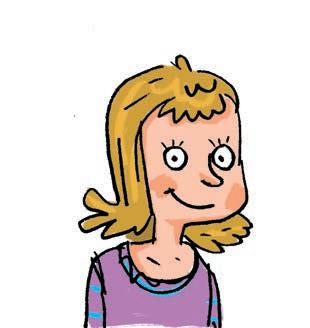
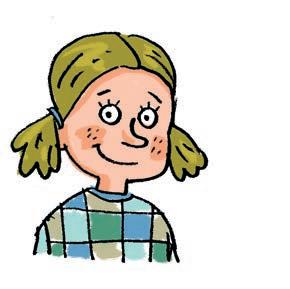
1 What’s your name?
5 What’s your address?
2 How old are you?
6 Is your house near or far from your school?
I haven’t got a brother or a sister. My best friend is
My address is 29, Baker Street. My house is far from my school. I go to school by bus.
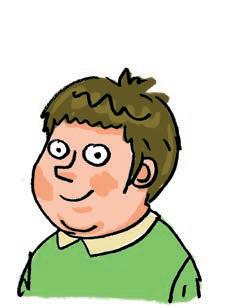
3 Where are you from?
7 How do you go to school?
4 Where do you live?
8 How many friends have you got?
I live in Liverpool. My house is near my school. I walk to school.
I’m in Year 5. My hobby is playing computer games. I like basketball best.
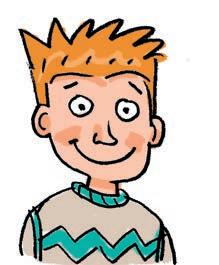
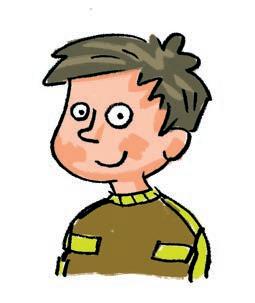
My favourite subject is History. I’m good at Maths. I’m not so good at spelling. I‘ve got a sister. My hobby is playing basketball. I’m in Year 7.
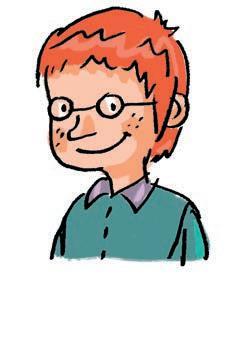
9 Who is your best friend?
13 What’s your favourite subject?
1 Match the children's answers on page 8 to the questions. There is more than one answer to some of the questions!
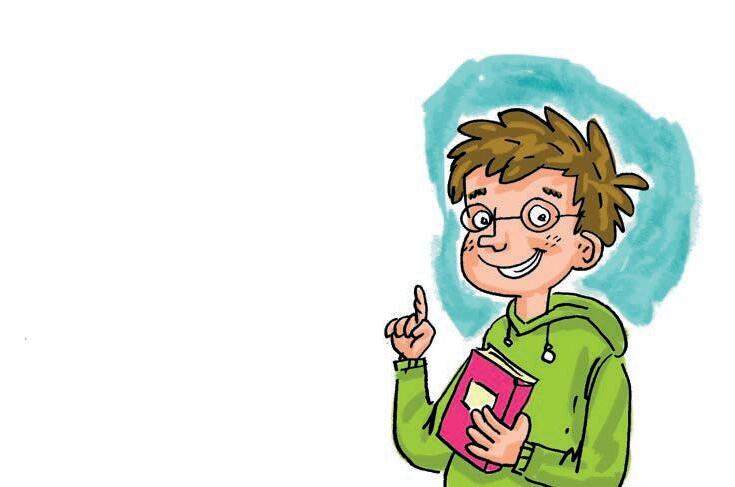
Example: Have you got a brother or a sister? I’ve got a sister.
10 What are you good at?
14 What are you not so good at?
2 Choose three questions and ask your friend.
11 What’s your hobby?
15 Which sport do you like best?
3 Pick a number, read the question and give a true answer.
12 What year are you in?
16 Have you got a brother or a sister?
4 Write true sentences about you.
• My name is _______________.
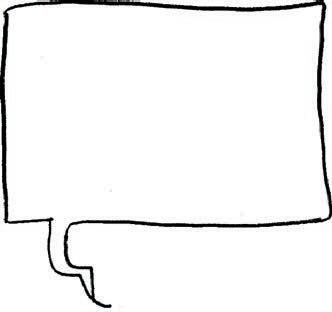
• I am ___________ years old.
• My address is _____________________.
• My house is ________________ my school.
• I’m in Year ______.
• My favourite subject is __________________.
• I’m good at _________________.
• I’m not so good at ______________.
• My hobby is _____________________.
• I’ve got __________________.
• I haven’t got ________________ .
Wow! More than 400 million people speak English as a first language in countries like Great Britain, the USA, Australia, and parts of Canada.

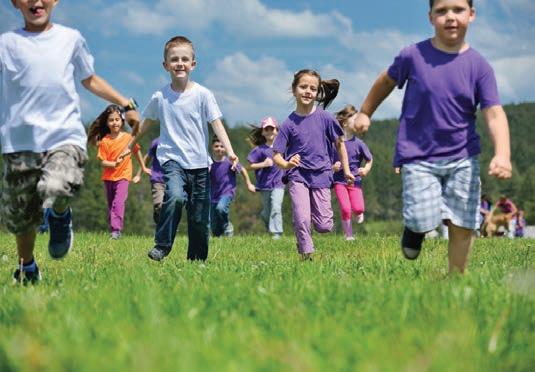



UNIT 1 – A Who are they?
B Do you have a minute?
UNIT 2 – A William’s school
B Time and timetables
UNIT 3 – A A day at school

B Oh, no! A test!
In Unit 1, you’ll study:
• study the verb ‘to be’: am, is, are
• meet some new people
• talk about jobs and interests
• interview your friends
In Unit 2, you’ll study:
• the present simple
• adverbs: always, every day, every week
• telling the time
• school subjects and timetables

• how to write a letter
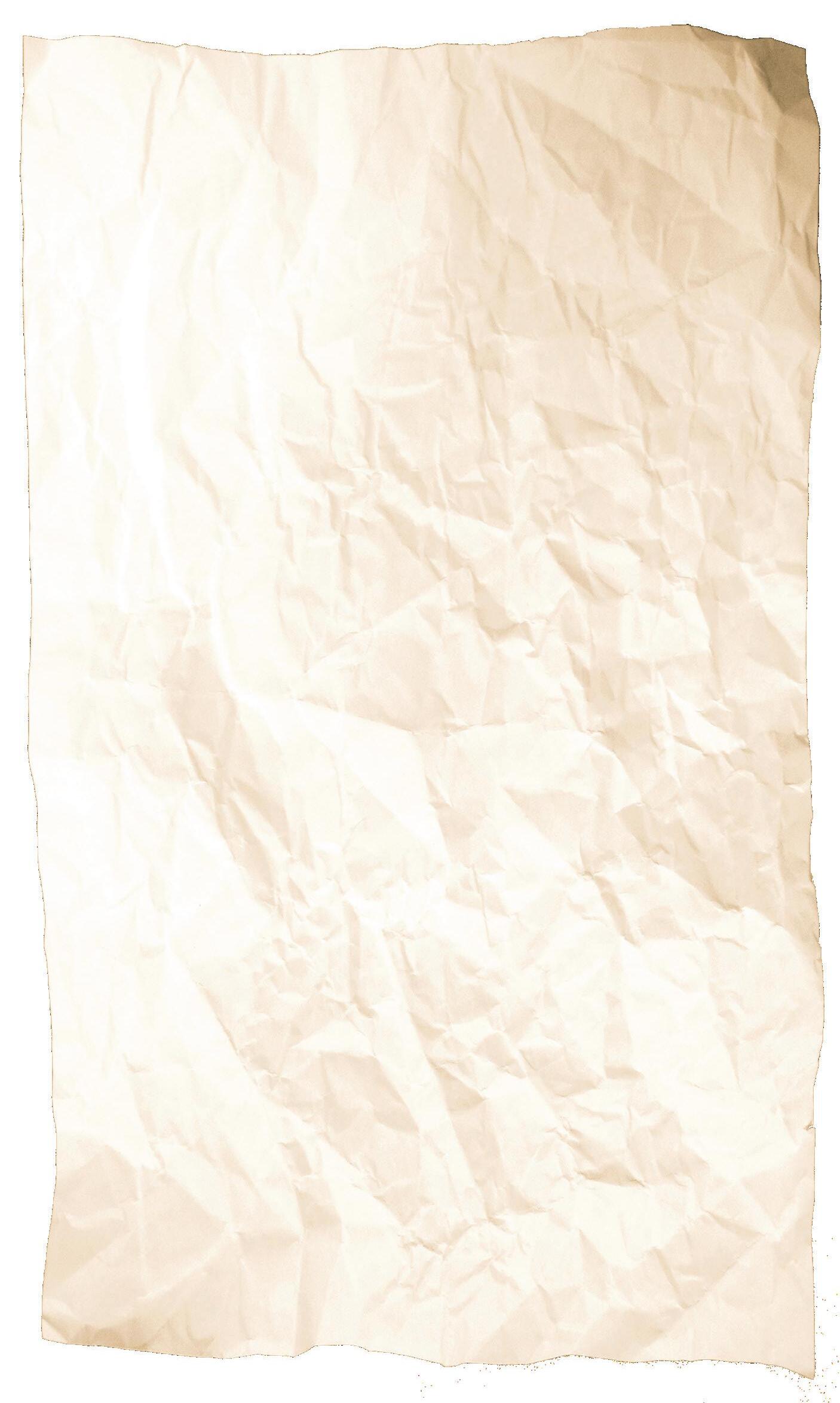
In Unit 3, you’ll study:
• the present simple tense
• adverbs: always, often, sometimes, usually, never
• the present continuous
• adverbs: now, at the moment
• prepositions: at, to, from, for, with
• object pronouns: me, you, him, her, it, us, them
• school activities
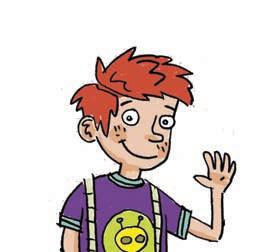
Here we are at school again. There are many new pupils and new teachers, too. Let’s meet some of them.
Track 1
William Potter (10 1/2)
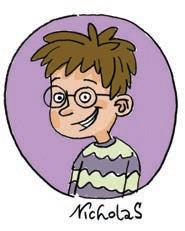
Hi. I’m William. My surname is Potter. I’m Scottish. My nickname is Red because of my red hair. My parents often call me Billy. I don’t like that - it’s so babyish! I’m ten and a half. I love playing football and I’m the best goalkeeper in school. I’m interested in drawing and painting. I hate History because there are so many dates to remember!

S usan Smith (11)
Hi! I’m Sue. My real name is Susan. My surname is Smith. I’m English. I’m eleven years old and I’m in year seven. I love reading and I’m interested in foreign countries. I’m good at foreign languages. I don’t like Maths because it’s very difficult.
1
Can you guess? Circle the right answer.
1. What is William’s favourite subject? Music/Art
Elizabeth Hopkins (11)
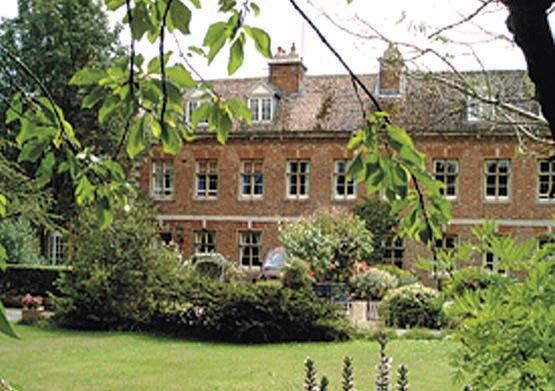
Hello! I’m Elizabeth Hopkins. I’m English. My friends call me Bess. My mother also calls me Bess, but when she is angry she calls me Elizabeth. I’m eleven and I love playing volleyball. I think it’s fun. I also play the piano. I’m interested in number problems. I hate drawing and I’m bad at Art.
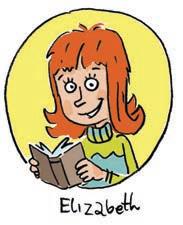
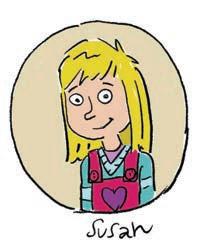
Nicholas Taylor (11 1/2)
Hello! My name is Nicholas Taylor, but everybody calls me Nick. I’m English. I’m eleven and a half and I’m in year seven. I love playing computer games. I’m also interested in studying maps and I like finding new rivers and mountains. I hate doing tests. They are so boring.
Track 2
2. What is Sue’s favourite subject? English/French
3. What is Elizabeth’s favourite subject? Geography/Maths
4. What is Nick’s favourite subject? History/Geography
WORD BANK
2 Listen and check your answers.
Remember!
… play football … … play the piano …
In some countries children start school at the age of six or seven. In Britain children start school at the age of five.
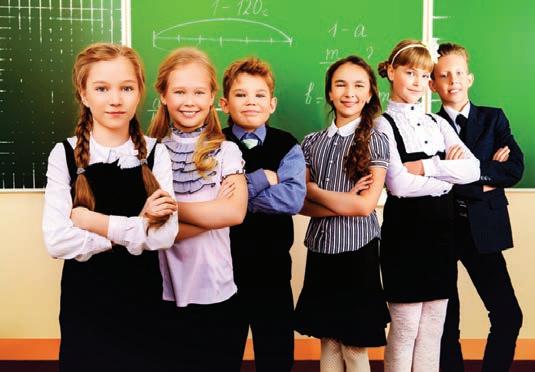
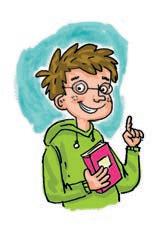
3 Look at the texts on page 12 and complete the sentences.
The present simple tense ‘to be’ – am, is, are
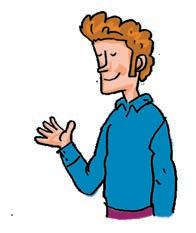
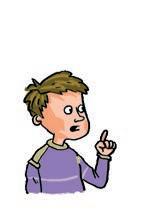
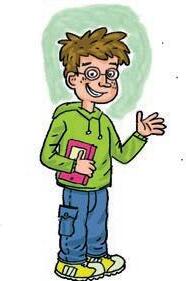
positive interrogative negative I am He/she/it is We/you/they are
Short forms:
Am I? Is he/she/it? Are we/you/they?
I am not He/she/it is not We/you/they are not
I am = I’m he is = he’s we are = we’re am not = ’m not is not = isn’t are not = aren’t
I _____ interested in drawing. My nickname ______ Red. They _________ so boring. What does 'interrogative' mean? It
'the question form'.
My footsteps
‘Are you good at Maths?’
‘I am not interested in Maths.’
‘He is good at English.’
4 Pick a footstep and complete the sentences.
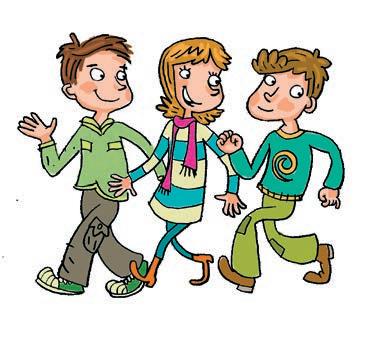
You can use a footstep only once!
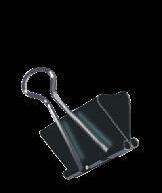
1. I ____ good at Maths.
2. You ___ not a teacher.
3. ___ she interested in languages?
4. He is not good ___ music.
5. Is ____ from England?
6. We are not ______ at English.
7. Are you _____ Serbia?
8. They are interested ____ sport.
5 Team work
1. How many sentences can you make?
Example: She is from England.
2. How many questions can you ask?
Example: Are you good at sport?
3. How many true sentences can you make?
Example: I am interested in music.
Listen before you read and answer the questions.
1. Is William famous at his school?
2. What is William’s dream?
3 You are a reporter!
Write the questions for William’s answers.
1. What_______________________? My name is William Potter.
2. How________________________?
I’m thirteen years old.
3. Where______________________? I’m from Scotland.
4. What_______________________? I’m good at football.
5. What_______________________? My favourite subject is History.
William and Susan are in the schoolyard. A TV reporter is there and many children are around him. The reporter wants to interview some pupils. They are excited!
William: What’s the fuss about? Is it about the new uniforms?
Sue: No! It’s not! Look at the man with a camera!
William: The tall one? Who is he?
Sue: He’s a TV reporter. He wants to interview some pupils.
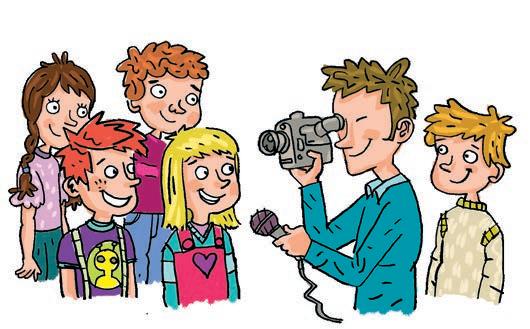
William: Oh, cool! Can I talk to him? I want to be on TV. I want to be famous.
Sue: But you’re already famous. You’re the best goalkeeper in school.
William: Yes, I am. I’m famous at this school. But I’m not famous in Britain, in Europe, in America ...
Sue: Oh, you want to be world famous!
William: Of course!
Sue: Oh, come on. Stop boasting!
1. Are the pupils happy?
2. Is the fuss about the new uniforms?
3. Is William famous in Britain?
4 What do you think?
Are William’s answers true? Which are not? Give the correct answers!
5 Pair work
Find a partner. Look at pages 100 and 101. One of you is ‘A’ and the other is ‘B’. Ask your partner questions and fill in his/her information below.
Name ___________________ Age _____
Nickname ________________
Country _________________
Skills ___________________
Favourite subject __________________
WORD BANK
године
6 Find a friend who is
... interested in ...
... good at ...
... bad at ...
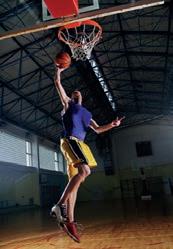

Report
_____________________ is interested in playing basketball.
_____________________ is interested in playing the violin.
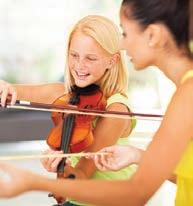
_____________________ is interested in computer games.
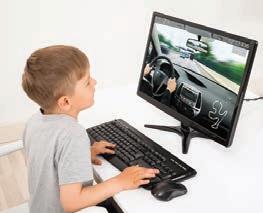
_____________________ dancing.

_____________________ painting.
_____________________ cooking.

Unscramble.
1. surname What’s your? ____________________________________________________________?
2. nickname your What’s? ____________________________________________________________?
3. old are How you? ____________________________________________________________?

4. are What year you in? ____________________________________________________________?
5. What good you are at? ____________________________________________________________?
6. are you What interested in? _________________________________________________________?
Now ask your friend the above questions and complete the table.
His/her surname is _______.
____ nickname is ________.
_____ is ______ years old.
_____ is in year ________.
_____ is good at ________.
_____ is interested in _____.
Tell the class about your friend.
What does 'chatting' mean?
It means 'talking'.
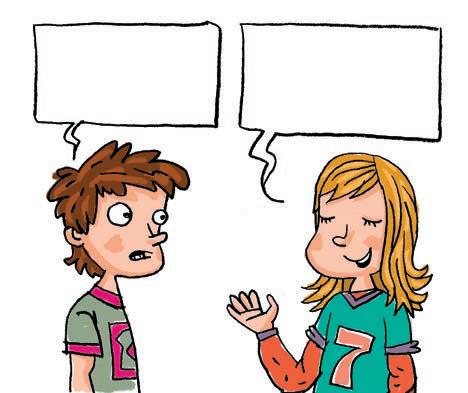
1 Look and say! Match a job to a picture.
1. a doctor

2. a s inger
3. a teacher
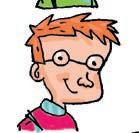
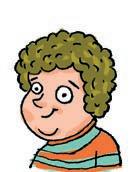

4. a p ilot


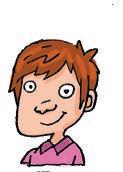
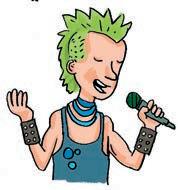
5. a policeman
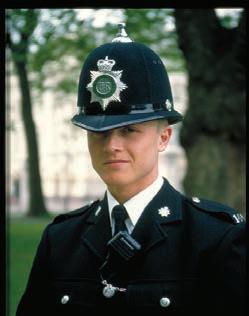
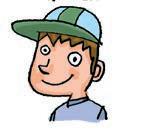
6. an architect
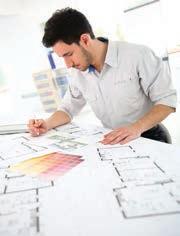
7. a cook
8. a reporter

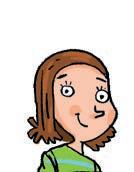
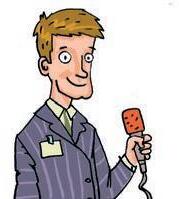
9. a footballer
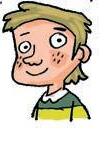
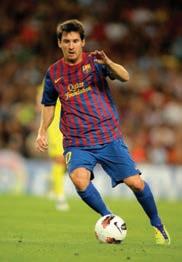
Remember! a/an + job
2 Find and say what you like and what you hate doing.
runningsingingcookingreadingpaintingdancingjumpinglaughing
I love making food. I love Counter Strike. I like reading.
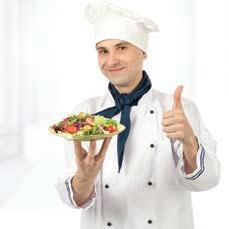
3 Read and say! What are they interested in?
I listen to CDs every evening. I play tennis and I love watching football.
I want to be a painter.
books cooking music art dancing sport chatting with friends
computer games
I go to a disco every evening.
I love talking to Kate for hours.
Example: Kath is interested in computer games.
We’re the Culture Crew. We’ll tell you something about life in Britain.
I’m Irish, but I live in Manchester. I’m interested in sport.
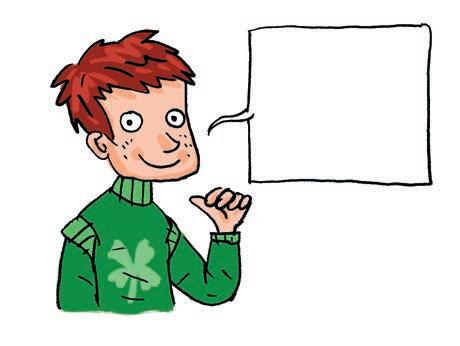
My parents are from Jamaica. We live in Nottingham. I’m good at music.

My grandparents are from India. My family lives in Bradford. I like cooking.
I’m Chinese. I live in London with my parents. My favourite subject is History. My friends call me Dave.


How well did you .....?
... learn ‘am, is, are’ the names of jobs ‘like/hate + …ing’

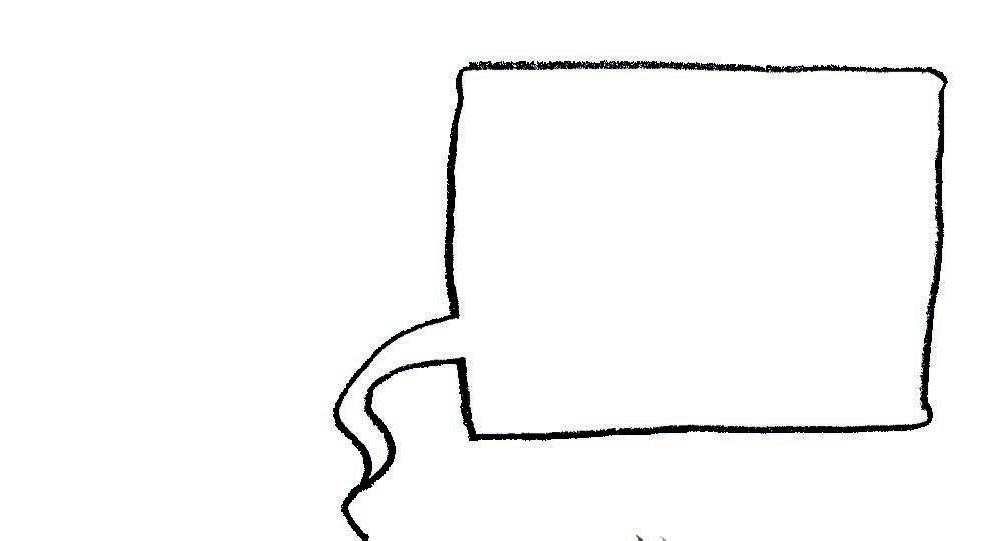
... do the team work exercise on page 13
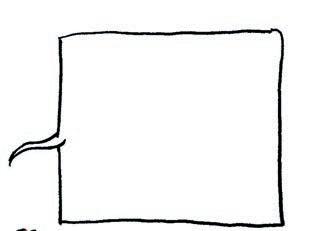 Patrick
Rajit
Melvin
Patrick
Rajit
Melvin
1 Read and answer.
Does William like his school? Why? Why not?
25 Baker Street Kingston KT 27JX ENGLAND
Dear Marko,
19th September
Thanks for your letter. Your school is so interesting! Do you want to know about my school?
I go to Kingston Secondary school. In England, we start secondary school when we’re 11. It’s quite a big school and it’s in the south of England, in London. It’s a mixed school, for both boys and girls. You know, here in England, there are high schools only for boys and only for girls, but I don’t think that’s much fun. My cousin Claire studies at an all-girls school. She also goes to school on Saturday mornings. Poor her! She must travel to school by bus. Her house is a mile away from school. She’s not very happy there, but she likes her school uniform. We wear uniforms, too. My mother says that our uniforms are nice, but I don’t think so! I prefer jeans and a T-shirt. Does your school have uniforms?

Our classes start at half past eight and the lunch break is at one o’clock. It lasts for an hour. Afternoon classes end at half past three. After school, I go home by bus. Susan is lucky. Her house is near school so she walks home.
I must go now because I must do my homework. Best wishes,
WilliamLook! 1 mile = 1,760 yards = 1,601 metres
2 Read the letter again and answer the questions.
1. Where is William’s school?
2. Does William like mixed schools?
3. Does Claire like her school?

4. What does William want to wear for school?
5. Do William and Susan go home together?
3 Complete the table with a tick () or a cross (). goes to a mixed school wears a uniform goes to school on Saturdays lives far from school
Where is your town?
It’s in the north of Scotland.
Remember! all-girls school = a school only for girls
Track 6
5 Can you complete the sentences using William's letter?
I to Kingston school. you to know about my school?
your school uniforms? think so. It for an hour.
The present simple tense
positive interrogative negative have
I/you/we/they HAVE…
(What) DO I/you we/they HAVE…?
I/you/we/they DON’T HAVE…
6
He/she it HAS…
(Why) DOES he/she/it HAVE…?
He/she/it DOESN’T HAVE… like
I/we/you /they LIKE…
He/she/it LIKES…
(How) DO I/ we/you/they LIKE…?
(When) DOES he/she/it LIKE…?
I/we/you/they DO NOT LIKE…
He/she/it DOES NOT LIKE…
You use the present simple for habits or things that are true: always, sometimes, usually, often, never, every day….. I always walk to school.
Short forms:
do not = don’t does not = doesn’t
7
My bookshelf
Do you like reading?
Yes, I do.
Pick a book and complete the sentences.
You can use a book only once!
1. I always walk to school. I ______ near school.
2. Helen thinks uniforms are nice. She _____ uniforms.
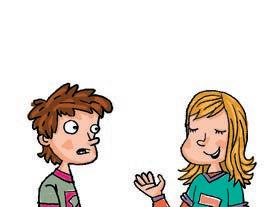
3. Claire lives far from school. She ______ to school by bus.
4. My sister and I live near school. ______ you live near school?
5. Nick and William like mixed schools. They do ____ like all-boys schools.
in Serbia she
by bus they goes English
live
does French likes to school in England
8

Maths
I uniforms
Team work
1. How many sentences can you make from the words on the books?
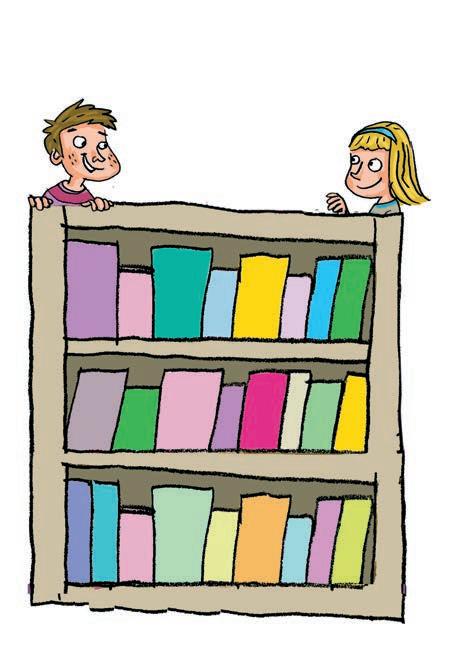
do you
go like
not walk lives
we he my friend
Example: She lives in England.
2. How many questions can you ask?
Example: Do they like French?
3. How many true sentences can you make?
Example: I do not live in England.
This is me in my school uniform! In many British schools pupils wear uniforms.
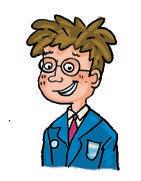
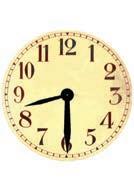
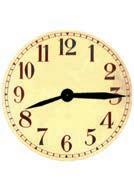

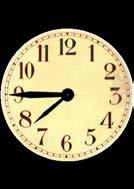
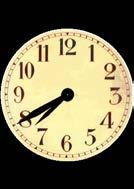
1 Look and read.
7.40. It’s twenty to eight.
7.45. It’s quarter to eight.
8.00. It’s eight o’clock.
Today is not William’s favourite day because he has two Maths lessons in the morning.
William: What time is Maths today?
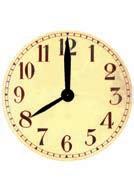
Sue: It starts at eleven and ends at one o'clock.
William: How many Maths lessons a week do we have?
Sue: Let me see the timetable - one lesson every day and two on Thursday. We have Maths six times a week.
William: SIX times a week! That’s TWENTY-FOUR times a month! That’s too much.
Sue: I don’t think so. Maths is fun.
William: You say it’s fun. I say it’s boring.
Sue: You mean it’s difficult. I know you’re bad at Maths.
William: Claire says it’s difficult, not me. I just don’t like numbers.
Sue: But numbers are important!
William: Do you want to know what is important?
Sue: What?
William: Football!
Sue: Oh, you boys! Useful language plus minus times divided by + - x :
8.15. It’s quarter past eight.
8.10. It’s ten past eight.
8.30. It’s half past eight.
What time is it now? It’s 11 am in Belgrade. It’s 10 am in London. It’s 5 am in New York.
2 Listen and choose the correct answer.
1. They have Maths five / six times a week.
2. Susan thinks Maths is fun / boring.
3. William thinks Maths is difficult / boring.
4. William thinks Art / football is important.
Now read the dialogue and answer the questions.
1. What day is it?
2. How many times do Susan and William have Maths every month?
3. What doesn’t William like?
4. Why doesn’t Claire like Maths?
5 Look at Nick’s timetable and answer the questions.
Name: Nicholas Taylor
7B

1. Does he have Music on Monday?
2. What subjects does he have on Tuesday?
3. How many French lessons does he have on Friday?
4. What time is Geography on Monday?
7 Time for a chat
Complete the table and say what you think.
SUBJECTinterestingboringeasy difficult History
1. What time does your English lesson start?

2. What time does your English lesson end?
Do you think English is important?
Example: I think History is important.
8 Interview your friends and complete the report.
• __________ thinks History is _______________.
• __________ thinks Maths is _______________.
Yes, I think so!
No, I don’t think so.
• __________ thinks English is _______________.
• __________ thinks Music is _______________.
1 Match a clock to a child.
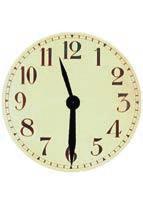
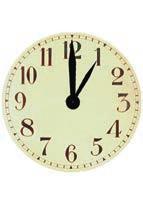
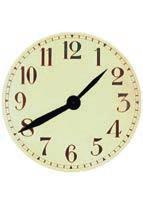
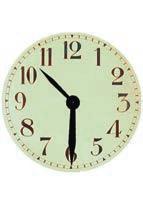
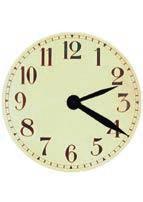
Music is at one o’clock.
1.00 pm
I have French at half past ten.
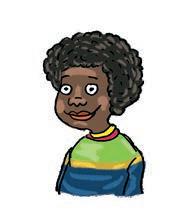
10.30 am
I have Science at twenty past two.
2.20 pm
PE is at half past eleven.
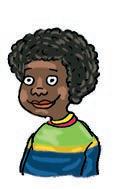
11.30 am
1.40 pm
2 Match a subject with the words. English Geography History Maths Art
a. dates, kings, queens
b. maps, places, rivers
3 Can you work this out?
c. divided by, times, numbers
d. colours, pictures, paper
e. words, talking, language
The English lesson starts at half past ten. The lesson lasts for 45 minutes. What time does it end? The answer is at the bottom of the page.
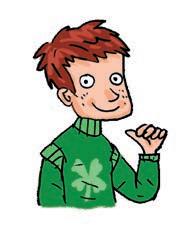
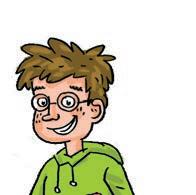
Do you like school uniforms? In England, a lot of children like uniforms. Many pupils wear modern uniforms, for example, a blue or grey jumper and jeans. Life is easy with uniforms – in the morning you don’t think ‘What can I wear today?’ or ‘My clothes aren’t cool. Other children will laugh at me!’
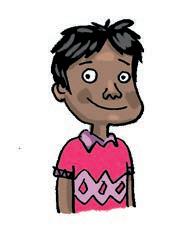
In some private schools, pupils have very traditional uniforms. I’m happy I don’t wear their uniforms. Look how funny they are!



ANSWER, ex. 3: At quarter past eleven.
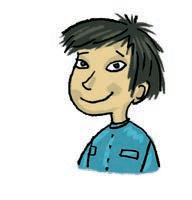 Our Art lesson is at twenty to two.
Our Art lesson is at twenty to two.
In British schools, children leave primary school when they are 11. Then they go to secondary school. We have three long holidays – at Christmas, Easter and in the summer. We go to school all day from 9 o’clock until 3 or 4. In the morning, we have ‘assembly’ – all the pupils in the school are together and we sing songs and listen to the headteacher. We have lots of boring subjects, but also some good ones, like Computing, DT, French and German. We sometimes have after-school activities, like sport, music, computers, photography, and country dancing.
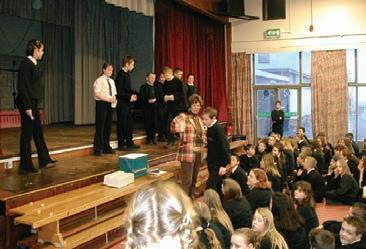
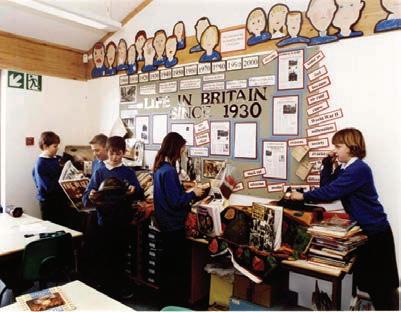
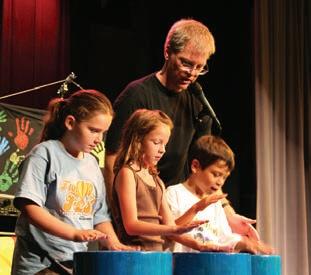
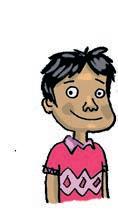
A school uniform costs over £100 (about 110 euros).
70% of English children like going to school.
British teenagers do homework for 11½ hours every week.
How well did you .....?
... learn ... do

to tell the time the present simple tense to write letters school subjects in Britain the team work exercise on page 19


Unit 2 was ...

Track 9
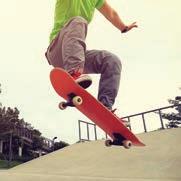
William is dreaming in the classroom. What is he thinking about? He is dreaming about football, of course.
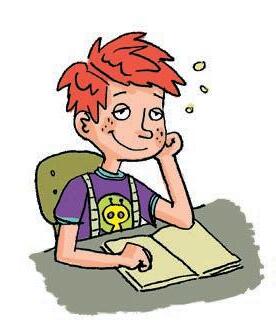
Hooray! It’s Thursday, my favourite day! We have PE today! What a lovely day for it! When the weather is nice, we often go to the playground. The boys usually play football and some of the girls play with us. They are quite good! Other girls play volleyball or badminton, but we never play with them. We sometimes go rowing, too. When it rains, we are never outside. We always go to the gym and we play squash, climb ropes and do gymnastics there. We often go swimming, too. There is a big swimming pool at our school.
1 Read the text and look at the pictures. Tick (√) the activities William mentions.
2
Are these sentences true (T) or false (F)?
1. William’s favourite day is Tuesday.
2. The weather is bad today.
3. The girls don’t play football with the boys.
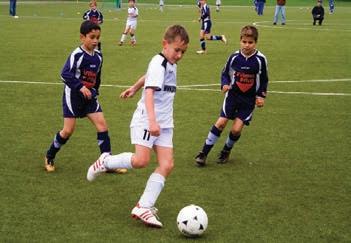
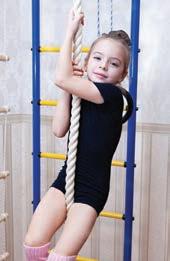
4. The boys sometimes play volleyball with the girls.
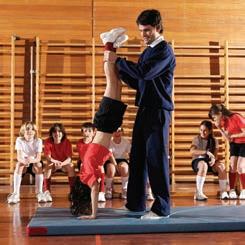

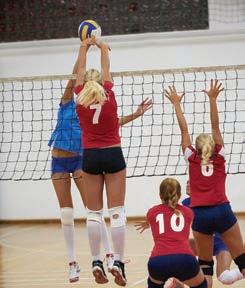
5. When it rains, they go to the gym.
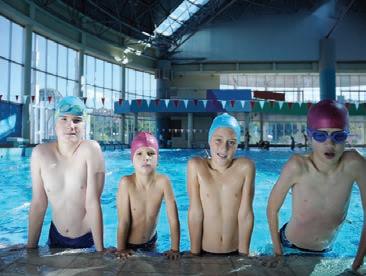

Track 10
3 Listen and check your answers.
Object pronouns
1. You sing really well. Can I sing with _____?
I to from with at for
me you you he him she her it it we us you you they them
6 Pair work
Complete the table. How often do you...?
2. I think she likes Peter and Harry. She always looks at _____.
3. Old people are interesting. I like talk ing to _____.
4. Look at ______. She is from China.
5. He is Red. It is a good nickname for ____.
6. We must listen. The teacher is talking to ____.
How often do you dream?
I never dream.
How often are you sad? I am never sad.
sometimes often usually always
neversometimesoftenusuallyalways go swimming play football do your homework climb ropes play computer games have breakfast
Look at your partner’s table and report.
Example: I often go swimming. He/she never climbs ropes.

What is the teacher saying? Oh, no. We’re having a Maths test today! Look! The teacher is counting the test papers and Sue is helping him. Now he’s giving the papers to her. Some pupils have mobile phones. How clever! But, look! The teacher is taking their phones away from them. Now Sue is giving out the papers. Oh, God! Please let it be easy!
Track 12
1 Read the text and answer.
1. Is William happy about the Maths test?
2. Who is helping the teacher?
3. Can pupils use mobile phones for their Maths test?
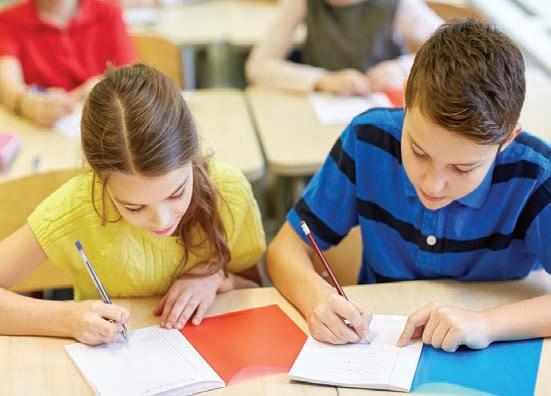
2
Listen. Why is the teacher angry?
Pupils must turn off their mobile phones and keep them in their backpacks when they are in the classroom.
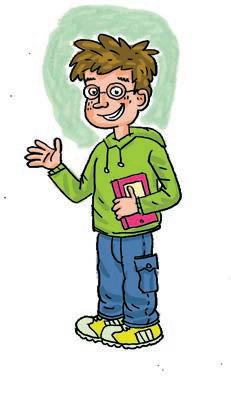
3 What do you think? Explain. Does William want to cheat?
Elizabeth: What are you doing William?! Are you trying to copy from me?
William: The problems are so difficult! Can you help me, Bess?
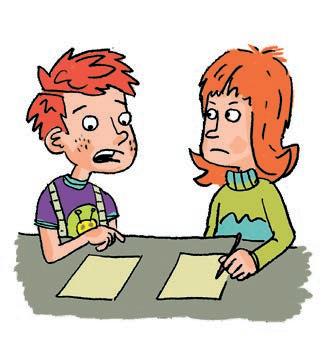
Elizabeth: Oh, no, not again! You always want me to help you! You never practise enough.
William: Please, please, Bess! I don’t want to get a bad mark. You know I’m terrible at maths.
Elizabeth: Stop talking! The teacher is looking at us. We’re in trouble now!
Teacher: You two are cheating! Give me your tests!
William and Elizabeth: We aren’t cheating, sir!
positive
I am sitting. He/she/it is sitting. We/you/they are sitting.
The present continuous tense
Am I sitting? Is he/she/it sitting? Are you/we/they sitting?
I am not sitting. He/she/it is not sitting. We/you/they are not sitting.
You use the present continuous tense to describe something that is happening now, at the moment, today.
Short forms: is not = He isn't/ He’s not dreaming. are not = They aren’t/ They’re not dreaming.
My mobile phone


we sitting talking they jumping it is sleeping laughing he are writing standing am singing I eating reading you she playing walking not
I am not = I’m not dreaming.
5 Pick a word from the screen and complete the sentences. You can use a word only once!
1. I’m busy! I am on the phone now.
2. Look at Claire! is playing with her friends.
3. Look at the cat! It is my fish.
4. We are in the park.
5. Stop talking! You are listening to me.
6. What the girls doing? They are reading.
6 Team work
1. How many sentences can you make from the words on the screen?
Example: They are jumping.
2. How many questions can you ask?
Example: Are you sleeping?
3. How many true sentences can you make?
Example: I’m not walking.
7 What are your friends doing now?
talking sleeping reading writing messages
laughing dreaming chewing gum yawning playing
Report to the class.
Example: ________ is talking.
I love sport and Britain is famous for football, but do you know these sports?
These men are playing cricket. We often play cricket at school in the summer. It is easy to play, but the rules are very difficult.
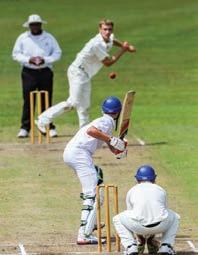
This is polo. It is Prince Charles’ favourite sport. Only rich people play and watch polo. You don’t play it at school and it is never on TV.
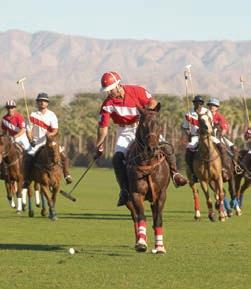


01
Bob gets £5 a week pocket money. Alan gets £1 a week more pocket money than Bob, but £2 less than Claire. How much pocket money does Claire get?
02 04
These girls aren’t playing basketball. They’re playing netball. Girls often play it in PE. It’s different to basketball. You can’t run with the ball.
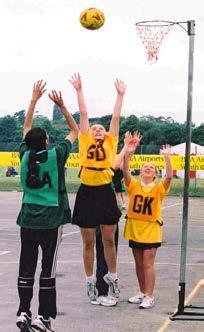



There are eighteen pages in the book. There are three pictures on every page. How many pictures are there in the book? 03
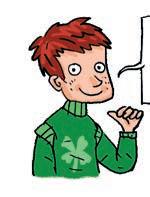

In one room of a zoo there are two birds, three snakes and ten cats. How many eyes are there? How many legs are there?
Answer: p.100
These boys are playing rugby. We play rugby in winter.
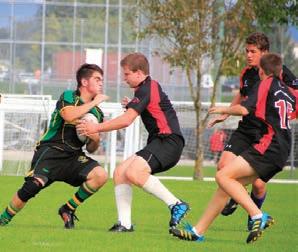
Track 13


Mr Tate’s a teacher
He teaches all day long. He reads and writes And sometimes shouts And then he sings this song.
I’m a super teacher
I teach all day long. I read and write And sometimes shout And then I sing this song.
Mrs Tate’s an artist
There are seven children at home. Every Sunday they share fifty-six pancakes. How many pancakes does each child eat?
She draws all day long. She draws and paints And cleans her brush And then she sings this song.
I’m a super artist
I draw all day long.
I draw and paint
And clean my brush And then I sing this song.
The answers are all words from Units 1 - 3
4. Maths isn't interesting. It's _____.
5. You are in _____ when you copy.

8. He's _____ in books.
10. I like painting - my favourite subject is _____.

11. I like dates - my favourite subject is _____.
15. Do you have a _____ phone?
16. We often go ______ on the river.
17. Mrs Tate's ______ artist.
18. I don't _____ when I sleep.
19. I never _____ when we have a test.
Answers: p.100
1. Three, ____, five
2. I'm Harold, but my ____ is Harry.
3. I _____ Maths before a test.
6. _____: 10 years old
7. I am ______ football.
9. France, Germany and Serbia are in ______.
12. London is in the _____ of England.
13. ____ you from England?
14. William goes to a _____ school, with boys and girls.
17. He's bad ____ sport.
18. ____ you like school?
How well did you .....?
... learn ... do
the present continuous object pronouns about British sports object pronouns the team work exercise on p. 27 Unit 3 was ...
A. What can you remember about William?
1 QUIZ Circle A or B and then check your answers at the bottom of the page.
1. What’s William’s surname? It’s Potter. It’s Taylor.
2. What’s his nickname? It’s Nick.It’s Red.
3. What's his nationality? ScottishEnglish
4. What’s his favourite subject? It’s Art. It’s History.
5. What’s he interested in? DancingDrawing
6. What does he love playing? Badminton.Football.
7. Does he wear a uniform? Yes, he does.No, he doesn’t.
8. What time do his classes start? At half past 8.At half past 9.
9. What’s his favourite day? It’s Tuesday.It’s Thursday.
10. Where does he have PE when it rains? Outside In the gym
2 Read the questions from the QUIZ and give full answers.
Example: His surname is Potter.
B. Check your grammar
1 TO BE
Complete with am (’m), is (’s), are (’re).
1. I _____ a teacher.
2. He ____n’t interested in music.
3. They ______n’t good at swimming.
4. Are you a footballer? No, I ___ not.
5. Is Moira good at singing? Yes, she _____.
2 THE PRESENT
–Circle the right word and read the sentences.
1. William usually wear/wears white trainers.
2. The boys sometimes play/plays football with the girls.
3. They don’t/doesn’t play badminton every day.
4. Does he always have/has History at half past eight?
5. He doesn’t/don’t have Maths on Friday.
A. Complete with – ing form.
1. What are you ________________?(do)
2. I’m _________________ at the moment. (eat)
3. Is Tom ___________History now? (study)
4. No. He’s __________a letter. (write)
B. Read the questions and give short answers.
1. Is your teacher looking at you at the moment? Yes, _______.
2. Are you dreaming? No, ____________.
3. Is he copying from you? Yes, ____________.
4. Are the pupils writing now? No, ____________.
Complete with her, him, us, them, me.
1. She is so clever. I always study with _____.
2. We must be quiet. The teacher is looking at ____.
3. They are playing football. Let’s play with ________.
4. She is angry with Nick. She doesn’t want to talk to ____.
5. Come to my house if you want to talk to _____.
C. Pronunciation – Find and write the sound
street have trick red walks wears teaches meal at sit friend talks goes watches feet Sam Nick weather likes plays studies
D. Check your vocabulary
1 What are they good at? Complete with Maths, French, Geography, Music.
1. She’s interested in maths problems. She’s good at ________.
2. She likes foreign languages. She’s good at ____________.
3. She’s interested in reading maps. She’s good at __________.
4. She loves singing. She’s good at ______________.
3 What’s the time? Read and match.
1. It’s ten o’clock. a) 7.45
2. I t’s quarter past nine. b) 8.30
3. It’s quarter to eight. c) 9.15
4. I t’s half past eight. d) 10.00
_____
• a big sheet of paper
• glue
Work in groups of 6-10.
2 Complete the sentences with teacher, farmer, reporter, singer, painter.
1. He works on a farm. He’s a _________________.
2. He interviews people for TV. He’s a ____________.
3. She sings in a band. She’s a __________.
4. He paints beautifully. He’s a ____________.
5. She teaches students. She’s a ______________.
4 Complete with am or pm.
1. I have breakfast at 7.30 ____.
2. We usually have dinner at 8.30 ____.
You need:
• scissors
• coloured pencils
• coloured paper
• old magazines
INSTR UCTIONS:
Use coloured pencils to write the name of your school, the number of pupils in your class, the name of the class, and the date on a big sheet of paper.
Each pupil can stick his/her photo onto the paper and write 4 sentences under the picture. Write your age, what you are interested in, what you are good at, and what your favourite sport and subject is.
• photos of pupils and teachers
Ask one of your teachers for a photo, stick it onto the paper and write the name of your teacher and what subject he/she teaches.
Write the names of all your subjects on strips of coloured paper and stick them onto the sheet of paper.
Find pictures of classroom objects (e.g. boards, desks, rulers, pencil cases, sharpeners, books, notebooks) in your old magazines. Cut them out and stick them onto the sheet of paper. Show your poster to the class and talk about it.
Серија уџбеничких комплета намењена учењу енглеског језика од 5. до 8. разреда, пета до осма година учења

– презентује језички материјал на забаван начин,
– ставља тежиште на комуникативне, фонолошке, лексичке и граматичке области које су нашим ученицима тешке или нејасне,
– доприноси подизању културне свести – уводи елементе културе и цивилизације земаља енглеског говорног подручја и представља културна обележја наше земље,
– даје списак енглеских речи преведених на српски, ревизије и пројекте,
– даје упитнике за самоевалуацију,
– у потпуности прати програм, стандарде и ритам дневне наставе у окружењу у коме
се енглески учи као страни језик.
Уџбенички комплет чине: уџбеник, радна свеска, аудио-запис, приручник за наставнике са припремама за час и тестови за проверу знања.
